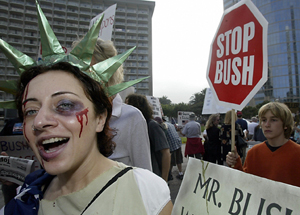|
CommentaryThe Antiwar Movement
|
 |
|
People protest outside a Republican fundraising party at the Century Plaza Hotel in Los Angeles. |
Governor Howard Dean said it best: "A year ago, the Democrats were falling all over each other to vote for the war in Iraq. They sure don't talk like that now."
It was grassroots mobilization that fueled the formerly obscure and moderate Dean's emergence as a powerful candidate. In turn, Dean's internet-based, antiwar insurgency set the tone for the primary campaign. By energetically attacking George W. Bush and Bush's war, he gave hope and voice to many who usually feel taken for granted by politicians.
Congressman Dennis Kucinich and Al Sharpton--and to some degree Carol Moseley Braun--brought greater substance to their peace-and-justice-focused campaigns. But Dean proved best able to fan the smoldering fires of discontent with the Bush presidency.
To do so Dean raised unprecedented amounts of money from small contributors--$47 million by the time he withdrew.
According to Vietnam-era antiwar activist and former California state senator Tom Hayden: "On war and peace, jobs and trade, civil rights and civil liberties, and the environment, the Democratic Party is being shaped more by its own insurgent constituencies on the ground than by its internal leadership, consultants and pollsters, [or] fundraising professionals."
Once roused, Democratic voters sensed an opportunity to actually defeat Bush in November. Kerry proved just well financed and politically savvy enough to catch the rush to "electability" and collect victories in the early primaries.
Although Kerry was a Vietnam War hero who turned against that war, as a politician he has never been a champion of peace and justice. He voted for the Iraq war and the PATRIOT Act, and has never suggested he would withdraw the troops from Iraq.
He also demonstrated a willingness to trade U.S. workers' jobs and international fairness for "free trade" U.S. corporate profits.
Yet when he adopted Dean's hard-hitting antiwar, anti-Bush rhetoric, Kerry's popularity surged. Concurrently, Bush's approval ratings sank to its lowest point since he came into office. Some polls now show either Kerry or Senator John Edwards beating Bush. It is unclear whether Ralph Nader will affect this equation.
Of course the president has not yet brought his vast treasure chest to bear on the campaign. Bush says he will run as a "War President" and poses his re-election as endorsement of his military and economic policies. His administration has proven utterly ruthless in both electoral and policy tactics. The campaign promises to be dirty and expensive.
Anger at Bush is at a boiling point, but no serious presidential contender is a peace and justice candidate. Antiwar activists must act imaginatively to ensure that the issues of war, occupation and racism do not get lost amid the sound-byte driven electioneering.
We should set our sights on exerting even more influence on the tenor, substance and size of the anti-Bush campaign between now and November.
We must build our organizations and campaigns, and demand of all candidates--and whoever occupies the White House--that the U.S. immediately withdraw from Iraq and work for justice and equity at home and abroad.
Jan Adams is a political consultant and handles national distribution of War Times.
| Month in Review |
|---|
|
August 2010: |
| PAST articles |
Detoit: I Do Mind Empire (USSF Recap) “Bring the War (English) Time for Rebirth: (English) War Weariness, Military Heft, and (English) The Global Military Industrial Complex (English) A Stalled (English) Bush's Iraq “Surge”: Mission Accomplished? Iran: Let's Start with Some Facts Nuclear Weapons Forever (English) Time to End the Occupation of Iraq First-Hand Report from the Middle East (English) Haditha is Arabic (English) A Movement to End Militarism From Soldier to Students Not Soldiers Israel's "Disengagement" U.S. Soldiers Torture: Help Stop Torture — Be All You Can Be: OCTOBER 2006
|
|
War Times/Tiempo de Guerras is a fiscally sponsored project of the |